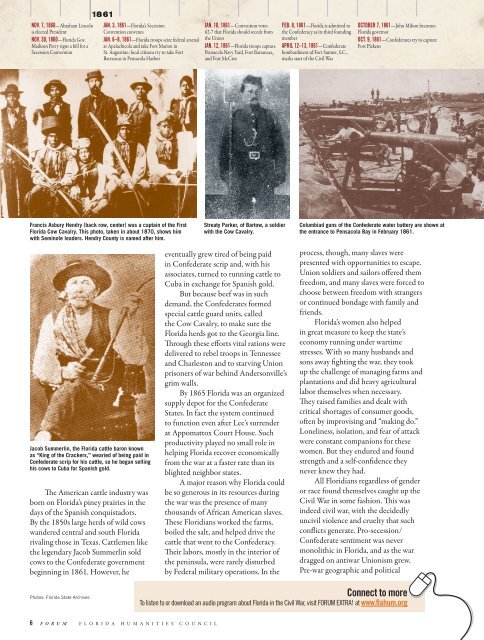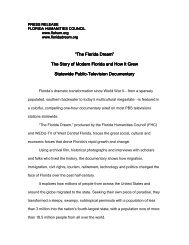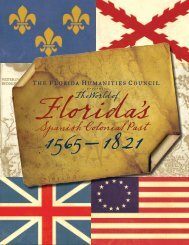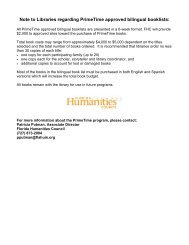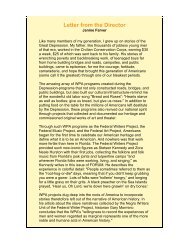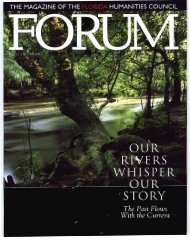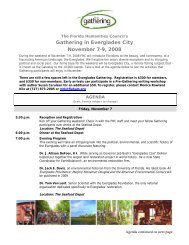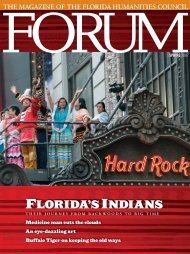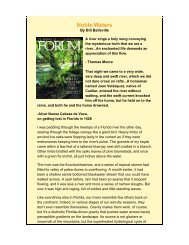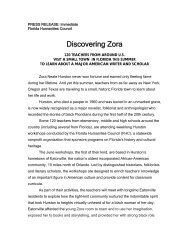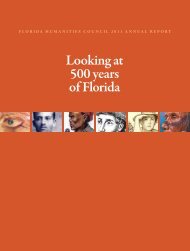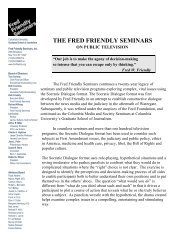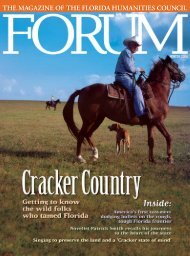when florida “Opened up the gates of hell” - Florida Humanities ...
when florida “Opened up the gates of hell” - Florida Humanities ...
when florida “Opened up the gates of hell” - Florida Humanities ...
You also want an ePaper? Increase the reach of your titles
YUMPU automatically turns print PDFs into web optimized ePapers that Google loves.
NOv. 7, 1860—Abraham Lincoln<br />
is elected President<br />
NOv. 30, 1860—<strong>Florida</strong> Gov.<br />
Madison Perry signs a bill for a<br />
Secession Convention<br />
1861<br />
The American cattle industry was<br />
born on <strong>Florida</strong>’s piney prairies in <strong>the</strong><br />
days <strong>of</strong> <strong>the</strong> Spanish conquistadors.<br />
By <strong>the</strong> 1850s large herds <strong>of</strong> wild cows<br />
wandered central and south <strong>Florida</strong><br />
rivaling those in Texas. Cattlemen like<br />
<strong>the</strong> legendary Jacob Summerlin sold<br />
cows to <strong>the</strong> Confederate government<br />
beginning in 1861. However, he<br />
JAN. 3, 1861—<strong>Florida</strong>’s Secession<br />
Convention convenes<br />
JAN. 6–8, 1861—<strong>Florida</strong> troops seize federal arsenal<br />
at Apalachicola and take Fort Marion in<br />
St. Augustine; local citizens try to take Fort<br />
Barrancas in Pensacola Harbor<br />
Francis Asbury Hendry (back row, center) was a captain <strong>of</strong> <strong>the</strong> First<br />
<strong>Florida</strong> Cow Cavalry. This photo, taken in about 1870, shows him<br />
with Seminole leaders. Hendry County is named after him.<br />
Jacob Summerlin, <strong>the</strong> <strong>Florida</strong> cattle baron known<br />
as “King <strong>of</strong> <strong>the</strong> Crackers,” wearied <strong>of</strong> being paid in<br />
Confederate scrip for his cattle, so he began selling<br />
his cows to Cuba for Spanish gold.<br />
Photos: <strong>Florida</strong> State Archives<br />
6 F O R U M F L O R I D A H U M A N I T I E S C O U N C I L<br />
JAN. 10, 1861—Convention votes<br />
62-7 that <strong>Florida</strong> should secede from<br />
<strong>the</strong> Union<br />
JAN. 12, 1861—<strong>Florida</strong> troops capture<br />
Pensacola Navy Yard, Fort Barrancas,<br />
and Fort McCree<br />
Streaty Parker, <strong>of</strong> Bartow, a soldier<br />
with <strong>the</strong> Cow Cavalry.<br />
eventually grew tired <strong>of</strong> being paid<br />
in Confederate scrip and, with his<br />
associates, turned to running cattle to<br />
Cuba in exchange for Spanish gold.<br />
But because beef was in such<br />
demand, <strong>the</strong> Confederates formed<br />
special cattle guard units, called<br />
<strong>the</strong> Cow Cavalry, to make sure <strong>the</strong><br />
<strong>Florida</strong> herds got to <strong>the</strong> Georgia line.<br />
Through <strong>the</strong>se efforts vital rations were<br />
delivered to rebel troops in Tennessee<br />
and Charleston and to starving Union<br />
prisoners <strong>of</strong> war behind Andersonville’s<br />
grim walls.<br />
By 1865 <strong>Florida</strong> was an organized<br />
s<strong>up</strong>ply depot for <strong>the</strong> Confederate<br />
States. In fact <strong>the</strong> system continued<br />
to function even after Lee’s surrender<br />
at Appomattox Court House. Such<br />
productivity played no small role in<br />
helping <strong>Florida</strong> recover economically<br />
from <strong>the</strong> war at a faster rate than its<br />
blighted neighbor states.<br />
A major reason why <strong>Florida</strong> could<br />
be so generous in its resources during<br />
<strong>the</strong> war was <strong>the</strong> presence <strong>of</strong> many<br />
thousands <strong>of</strong> African American slaves.<br />
These Floridians worked <strong>the</strong> farms,<br />
boiled <strong>the</strong> salt, and helped drive <strong>the</strong><br />
cattle that went to <strong>the</strong> Confederacy.<br />
Their labors, mostly in <strong>the</strong> interior <strong>of</strong><br />
<strong>the</strong> peninsula, were rarely disturbed<br />
by Federal military operations. In <strong>the</strong><br />
FEB. 8, 1861—<strong>Florida</strong> is admitted to<br />
<strong>the</strong> Confederacy as its third founding<br />
member<br />
APrIl 12–13, 1861—Confederate<br />
bombardment <strong>of</strong> Fort Sumter, S.C.,<br />
marks start <strong>of</strong> <strong>the</strong> Civil War<br />
OCTOBEr 7, 1861—John Milton becomes<br />
<strong>Florida</strong> governor<br />
OCT. 9, 1861—Confederates try to capture<br />
Fort Pickens<br />
Columbiad guns <strong>of</strong> <strong>the</strong> Confederate water battery are shown at<br />
<strong>the</strong> entrance to Pensacola Bay in February 1861.<br />
process, though, many slaves were<br />
presented with opportunities to escape.<br />
Union soldiers and sailors <strong>of</strong>fered <strong>the</strong>m<br />
freedom, and many slaves were forced to<br />
choose between freedom with strangers<br />
or continued bondage with family and<br />
friends.<br />
<strong>Florida</strong>’s women also helped<br />
in great measure to keep <strong>the</strong> state’s<br />
economy running under wartime<br />
stresses. With so many husbands and<br />
sons away fighting <strong>the</strong> war, <strong>the</strong>y took<br />
<strong>up</strong> <strong>the</strong> challenge <strong>of</strong> managing farms and<br />
plantations and did heavy agricultural<br />
labor <strong>the</strong>mselves <strong>when</strong> necessary.<br />
They raised families and dealt with<br />
critical shortages <strong>of</strong> consumer goods,<br />
<strong>of</strong>ten by improvising and “making do.”<br />
Loneliness, isolation, and fear <strong>of</strong> attack<br />
were constant companions for <strong>the</strong>se<br />
women. But <strong>the</strong>y endured and found<br />
strength and a self-confidence <strong>the</strong>y<br />
never knew <strong>the</strong>y had.<br />
All Floridians regardless <strong>of</strong> gender<br />
or race found <strong>the</strong>mselves caught <strong>up</strong> <strong>the</strong><br />
Civil War in some fashion. This was<br />
indeed civil war, with <strong>the</strong> decidedly<br />
uncivil violence and cruelty that such<br />
conflicts generate. Pro-secession/<br />
Confederate sentiment was never<br />
monolithic in <strong>Florida</strong>, and as <strong>the</strong> war<br />
dragged on antiwar Unionism grew.<br />
Pre-war geographic and political<br />
Connect to more<br />
To listen to or download an audio program about <strong>Florida</strong> in <strong>the</strong> Civil War, visit FORUM EXTRA! at www.flahum.org


